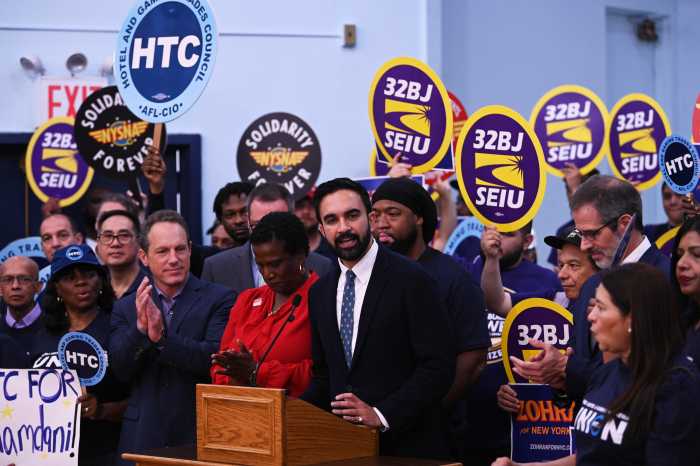By Dustin Brown
In what has emerged as a historic year for the Independence Party in Queens, a longstanding conflict between two of its factions threatens to curb its potential to garner votes.
For the first time in its brief existence, the Independence Party is putting forward its own candidates in three borough city council races rather than simply cross-endorsing major party candidates for every seat.
The history-making slate comes in the aftermath of a major turnover of party leadership in Queens and statewide, orchestrated by a coalition of party members who feared the organization was turning into a “rinky-dink patronage party.”
But the ousted leadership, which includes the founding chairman of the Independence Party in Queens, contends the organization is now run by a cult of extremists led by Dr. Lenora Fulani, a two-time presidential candidate with a long history of drawing controversy for anti-Semitic statements and extreme political views.
The Independence Party became a major presence in New York state after Tom Golisano’s 1994 bid for governor earned it more than the requisite 50,000 votes necessary to qualify for the ballot.
The party now occupies the coveted row “C” line on the ballot, meaning it received the most votes in the last election after the Democrats and Republicans.
This year three party members are running for city council seats in Queens: John Baxter for Alfonso Stabile’s 32nd District seat (R-Ozone Park), Joseph Tiraco for Karen Koslowitz’s (D-Forest Hills) seat in the 29th District and Michael Mascitti for Speaker Peter Vallone’s (D-Astoria) 22nd District seat.
There are other candidates in Queens, such as Democrat Martha Flores-Vazquez in the 20th Council District and Republican Dennis Saffran in the 19th Council District, who are running on the Independence line but are not members of the party.
Current party leaders see the slate of candidates as a rebirth for the Independence Party, which has never run candidates on the ballot who were not also endorsed by the Democratic or Republican parties.
In Queens, a largely Democratic borough where a powerful third party could play a significant role in the general elections, the ability of the Independence Party to make a strong impact in this year’s elections remains to be seen.
“It seems to me that the Independence line had the potential to be a factor, but that the internal fighting has not allowed it to be a factor,” said Assemblywoman Cathy Nolan (D-Ridgewood).
The Independence Party was founded on a platform of governmental reform, aimed at putting power back in the hands of the voter and reducing the advantages of incumbency, while advocating fiscal responsibility in all levels of government.
But Gerald Everett, chairman of the Independence Party in Queens, said a statewide movement began in the late 1990s to oust any state and county leaders who failed to put any party members on the ballot.
“A lot of us were aghast that this was a rinky-dink patronage party, which is not what we got involved for,” Everett said. “Those of us who felt that way got together and decided we were going to take over the party.”
The reformers fought a court battle in 1999 to have party leaders elected instead of appointed, which enabled them to assume statewide party control the following year by vote. Among the fallen was founding borough party Chairman Michael Niebauer, who remains a bitter foe of the new leadership.
“They stole the party by fraudulent means by manipulating the rules and bylaws of the party,” Niebauer said last week in a phone interview. “They don’t have popular support.”
From Niebauer’s perspective, the new leadership’s desire to run a slate of Independence Party candidates was a plan he already intended to put in motion.
“My goal was to run a large slate in 2001,” Niebauer said. “I was going to tell everybody who was an active member of the party, ‘I want you to run for City Council.’ But, unfortunately, this cult came along and took over the party.”
Niebauer contends the new leaders in Queens and across the state are “puppets” of Fulani, a controversial party figure who holds no official position but was central in orchestrating the takeover.
Because of the controversy surrounding Fulani, the Independence Party’s endorsement of any major-party candidates has been construed by some to be a liability despite the powerful voter base brought in by the party’s line on the ballot.
Everett downplays Fulani’s extreme politics.
“If everybody that was active in politics and radical from the Sixties was hung up by their heels for what they had said, you’d have nobody walking,” he said.
Reach reporter Dustin Brown by e-mail at Timesledger@aol.com or call 229-0300, Ext. 154.
































